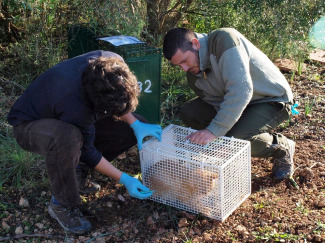Feral cats in Mallorca: a major reservoir of toxoplasmosis

Felids are the only reservoir of the parasite Toxoplasma gondii that can excrete oocysts resistant to the environment. This is a problem as in this state, parasites can survive long periods of time outside the host. This work has focused on the study of the rate of antibodies to T. gondii and Neospora caninum in feral cats, which are beyond all control epidemics. The cats were captured in Mallorca and the results point to one of the highest prevalence against T. gondii in the world.
In a study performed in Majorca with participation of researchers from the Wildlife Health and Control service (Conselleria de Medi Ambient, Govern de les Illes Balears- Fundació Natura Parc), and from UAB and CRESA, Barcelona, the antibodies to Toxoplasma gondii and Neospora caninum were determined in serum samples from 59 feral cats (Felis silvestris catus) captured in baited traps in Majorca, Balearic Islands, Spain.
Felids are important in the epidemiology of Toxoplasma gondii infection because they are the only hosts that can excrete environmentally-resistant oocysts, and there is little information of infections in truly free-living cats (Felis silvestris catus) because these cats are difficult to catch. These cats have no specific owner, are not subject of vaccination programs and do not receive prophylactic or curative treatments against parasites.
Antibodies to T. gondii assayed by the modified agglutination test (MAT) were found in 50 (84.7%) of 59 cats with a majority of cats having high MAT titers (>1:500 in 45 cats). Seroprevalence (MAT, 1:25 or more) was significantly higher in adults (94.6%) than in juveniles (<6 month old; 40.0%). Seroprevalence to N. caninum, assayed by cELISA (VMRD) and confirmed by an indirect fluorescent antibody test, was low (6.8%, 4 of 59). The prevalence of T. gondii observed in wild cats in Majorca is one of the highest reported worldwide in this species and the highest observed in Europe to date. The results suggest that feral cats in Majorca have a high rate of T. gondii infection with important implications for public health on the island since the seropositive cats are likely to have already shed T. gondii oocysts in the environment.
References
"Seroprevalence of Toxoplasma gondii and Neospora caninum in feral cats (Felis silvestris catus) in Majorca, Balearic Islands, Spain". Millán, J; Cabezón, O; Pabón, M; Almería, S. Veterinary Parasitology 165:323-326.


